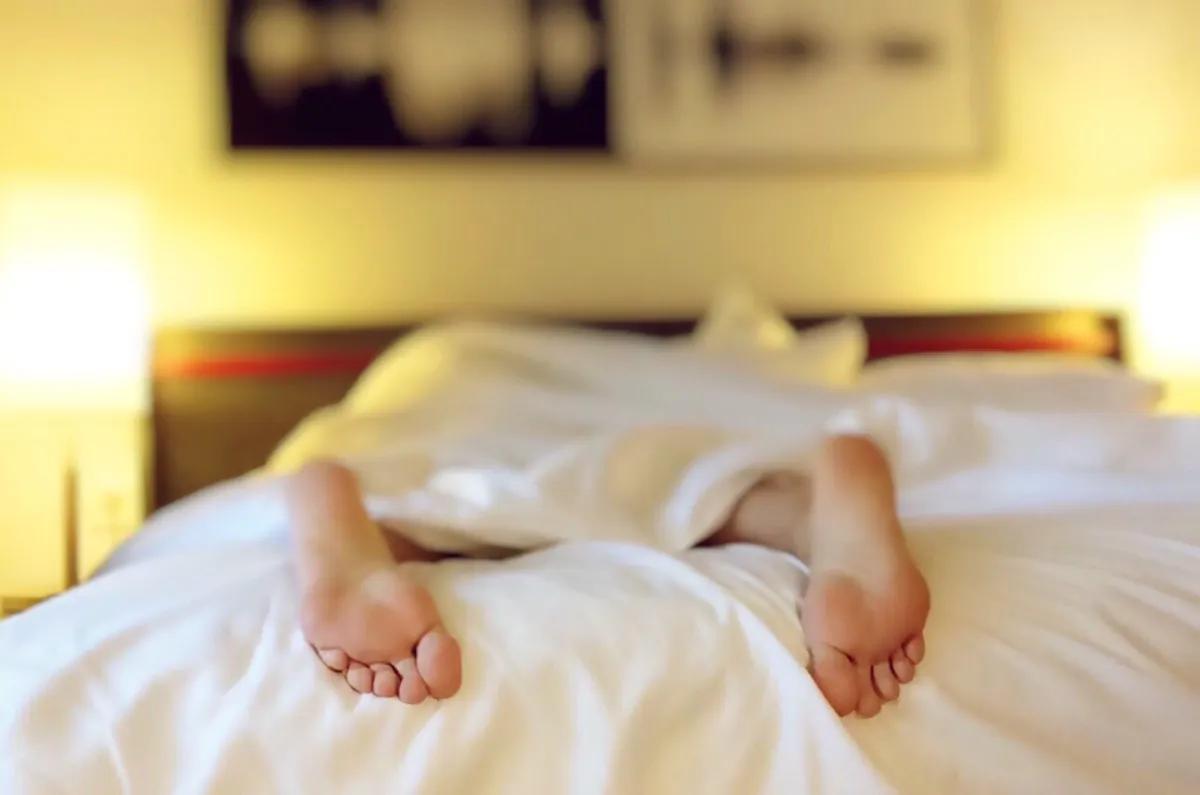
How Sleep Can Make or Break Your Health and Fitness
One of the simplest reasons people have a hard time reaching their health and fitness goals… they don’t sleep.
I know, I know… Who has time to sleep? We all live in constant distraction. The thing is, you have to make time. It has to be a priority. And if you're not prioritizing sleep, or you sleep significantly longer on days off (i.e. weekends), you likely aren't getting enough. Bad sleep habits negatively affect our overall health. According to the American Academy of Sleep Medicine (AASM), adults over age 18 should sleep at least seven hours a night for optimal health.
Our circadian rhythm, or sleep/wake cycle, is basically a 24-hour internal clock cycling in our brain and controlled by the hypothalamus. This rhythm is responsible for peaks and dips in energy levels throughout the day. Sometimes we find we're more or less energized at certain times of the day- this is our circadian rhythm at work.
When we're more sleep deprived, these altered levels of energy are more noticeable, whereas if we're all caught up on rest, we don't tend to notice them as much and our energy levels are much more consistent throughout the day.
Our internal clock controls the release of chemicals in our body in a daily rhythm. For example, light and darkness affect our circadian rhythm. When our eyes sense darkness/night time, this sends a signal to our brain, which sends a signal to our body to release melatonin, because it's time to prepare our body for sleep. However, artificial light (TVs, phones, other devices) too late in the evening can disrupt this cycle and make it more difficult to fall asleep. On the other hand, when the sun comes up, our body releases cortisol to prepare ourselves to wake up and take on the day.
Regular and consistent sleep patterns (i.e. same bedtime and same wake time) help our circadian rhythm in functioning at its best. However, when this gets disrupted (i.e. jet lag, time change, etc), we may feel "off" or have trouble focusing. Keeping in tune with our natural clock helps us feel better and more energized, rather than sluggish and lethargic.
While we sleep, our body is repairing itself from the previous day and preparing it for the next. This is why sleep and recovery are just as important as what you’re doing in the gym. If you’re killing it in the gym, but aren’t resting and sleeping nearly enough to recover, you’re likely sabotaging your progress, which is, of course, counterproductive.
Since our bodies rely on rest to repair itself to continue functioning properly, many chronic health issues are linked to sleep deficiency:
Heart Disease/Hypertension/Stroke
During sleep, our bodies heal and repair our heart and blood vessels.
Diabetes
Sleep affects how our bodies react to insulin, and sleep deficiency often results in higher blood sugar levels.
Obesity
During sleep, our bodies regulate levels of ghrelin (hunger hormone) and leptin (satiety hormone). A lack of sleep often causes a rise in ghrelin and a fall in leptin, resulting in more of a false appetite as opposed to when we're well rested.
Depression/Anxiety/ADHD
Studies suggest that proper sleep encourages mental and emotional resilience, while regular sleep disruptions can lead to negative thoughts, vulnerable emotional states, and difficulty focusing.
So, what are some benefits of healthy sleep habits?
Reduced risk of chronic health issues...
Increased and more stable energy levels...
More efficient metabolism…
Healthy brain function, focus, and memory...
Improved learning and creativity...
Increased productivity...
Healthy growth and development (especially important for young children!)...
Better overall moods…
And how does sleep deficiency affect us?
Increased risk of chronic health issues...
Hindered fitness progress when body isn’t adequately rested and recovered...
Difficulty making decisions/problem solving/getting along with others...
Slowed reaction time and more prone to error...
Difficulty managing emotions and overall behavior and/or coping with change, mood swings...
Increased risk of depression/anxiety/stressed...
Lack of motivation...
Altered immune system response and more susceptibility to illness...
This also greatly affects children too… Their moods, ability to manage emotions and behavior and/or cope with change, their motivation, their immune system, their reactions, their ability to get along with others, their ability to make decisions and solve problems… these are ALL greatly affected by their SLEEP! I’m not saying that medication is never necessary, but if your kid displays issues in these areas and isn’t even getting decent sleep, work on nailing this down first. You’ll most likely see a difference. As a parent, it should be a top priority to get your kids into healthy sleep routines for the long-term. Their current and future health and wellbeing literally depends on it.
People tend to think that one can learn to get by on minimal sleep with no negative effects. This is simply not true. There are plenty of studies showing that getting sufficient, quality sleep is necessary for our overall health and quality of life, not to mention safety as well.
So, focus on:
1. Getting enough sleep…
2. Getting quality sleep…
3. Sleeping at the right times…
Here are some tips as it relates to promoting healthy sleep habits…
MAKE time to sleep. Cut out some TV time or whatever you find yourself wasting time on in the evenings, and go to bed earlier. Most people who say they "aren't morning people," aren't morning people because they don't go to bed at night.
During the day, get outside and get moving. Light and physical activity earlier in the day help to promote a proper circadian rhythm. Physical activity during the day also helps one fall asleep faster and stay asleep come night time.
Ditch the devices at least an hour before bedtime and "set the mood" by dimming lights, decreasing volumes, etc. Make your environment quieter and darker to help signal the release of melatonin and prepare your body for sleep. Wind down. Also limit the bedroom activity to sleep (and sex). You'll begin to associate sleep with that environment rather than a wide variety of other things.
Avoid heavy meals (especially those high in fats/protein) and caffeine right before bedtime. Some may need to limit overall intake/avoid caffeine in general.
Avoid naps if you have trouble falling asleep at night.
Keep your bedroom quiet, dark, and cool.
Try to keep the same sleep schedule on weekends that you do during the week, give or take an hour or so.
Keep a sleep diary of when and how you sleep. Target trends and make adjustments as necessary.
Talk with your doctor if your job interferes with your sleep cycle (shift workers, night jobs, emergency personnel, on-call situations, etc.), if you're sleeping more than 8 hours a night and still don't feel rested, or if your efforts to improve your sleep don't help.
Make sure you’re getting enough calcium, magnesium, and vitamin B6. Calcium and magnesium aid in sleep by helping deactivate adrenaline (Mg) and aiding in the production of melatonin (Ca). Dairy products with the amino acid tryptophan (converts to melatonin) and the mineral calcium make for some of the best natural sleep inducers by way of melatonin production. Vitamin B6 also aids in converting tryptophan to melatonin.
U.S. RDA values for:
Calcium
Adults 19-50: 1,000mg/day
Adults 51+: 1,200mg/day
Magnesium
Adult Men 19-30: 400mg/day
Adult Men 31+: 420mg/day
Adult Women 19-30: 310mg/day
Adult Women 31+: 320mg/day
Vitamin B6
Adults 19-50: 1.3mg/day
Men 51+:1.7mg/day
Women 51+: 1.5mg/day
(Side note- typically, the more protein one eats, the more B6 is needed for amino acid metabolism, so those with high protein diets may need more B6).
I hope this sheds some light on WHY sleep is important and for what. We all hear the typical recommendations for how many hours we should spend asleep, but most people underestimate the power of sleep and think that years of sleeping four hours a night won’t catch up to them or show up by means of other symptoms besides simply feeling tired. A lot happens when we’re sleeping! So if you’re not sleeping enough, start small. Cut off the TV and go to bed 30 minutes earlier this week. Even if you’re not tired, start those night-time rituals of “setting the mood” and rewire your rhythm. Like I said, find ways to make it a priority- for you AND your family!
Keep shining.
Your trainer & coach,
Kandis
